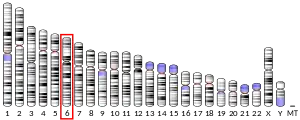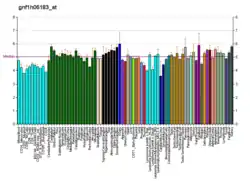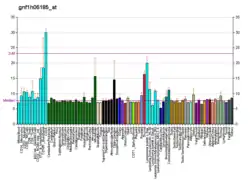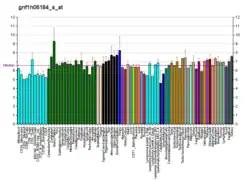SLC2A12
Solute carrier family 2, facilitated glucose transporter member 12 is a protein that in humans is encoded by the SLC2A12 gene.[5][6][7]
| SLC2A12 | |||||||||||||||||||||||||||||||||||||||||||||||||||
|---|---|---|---|---|---|---|---|---|---|---|---|---|---|---|---|---|---|---|---|---|---|---|---|---|---|---|---|---|---|---|---|---|---|---|---|---|---|---|---|---|---|---|---|---|---|---|---|---|---|---|---|
| Identifiers | |||||||||||||||||||||||||||||||||||||||||||||||||||
| Aliases | SLC2A12, GLUT12, GLUT8, solute carrier family 2 member 12 | ||||||||||||||||||||||||||||||||||||||||||||||||||
| External IDs | OMIM: 610372 MGI: 3052471 HomoloGene: 59263 GeneCards: SLC2A12 | ||||||||||||||||||||||||||||||||||||||||||||||||||
| |||||||||||||||||||||||||||||||||||||||||||||||||||
| |||||||||||||||||||||||||||||||||||||||||||||||||||
| |||||||||||||||||||||||||||||||||||||||||||||||||||
| |||||||||||||||||||||||||||||||||||||||||||||||||||
| |||||||||||||||||||||||||||||||||||||||||||||||||||
| Wikidata | |||||||||||||||||||||||||||||||||||||||||||||||||||
| |||||||||||||||||||||||||||||||||||||||||||||||||||
See also
References
- GRCh38: Ensembl release 89: ENSG00000146411 - Ensembl, May 2017
- GRCm38: Ensembl release 89: ENSMUSG00000037490 - Ensembl, May 2017
- "Human PubMed Reference:". National Center for Biotechnology Information, U.S. National Library of Medicine.
- "Mouse PubMed Reference:". National Center for Biotechnology Information, U.S. National Library of Medicine.
- Joost HG, Thorens B (Jan 2002). "The extended GLUT-family of sugar/polyol transport facilitators: nomenclature, sequence characteristics, and potential function of its novel members (review)". Mol Membr Biol. 18 (4): 247–56. doi:10.1080/09687680110090456. PMID 11780753. S2CID 22667943.
- Rogers S, Macheda ML, Docherty SE, Carty MD, Henderson MA, Soeller WC, Gibbs EM, James DE, Best JD (Feb 2002). "Identification of a novel glucose transporter-like protein-GLUT-12". Am J Physiol Endocrinol Metab. 282 (3): E733–8. doi:10.1152/ajpendo.2002.282.3.E733. PMID 11832379. S2CID 22919544.
- "Entrez Gene: SLC2A12 solute carrier family 2 (facilitated glucose transporter), member 12".
Further reading
- Baumann MU, Deborde S, Illsley NP (2003). "Placental glucose transfer and fetal growth". Endocrine. 19 (1): 13–22. doi:10.1385/ENDO:19:1:13. PMID 12583599. S2CID 26301249.
- Strausberg RL, Feingold EA, Grouse LH, et al. (2003). "Generation and initial analysis of more than 15,000 full-length human and mouse cDNA sequences". Proc. Natl. Acad. Sci. U.S.A. 99 (26): 16899–903. Bibcode:2002PNAS...9916899M. doi:10.1073/pnas.242603899. PMC 139241. PMID 12477932.
- Wood IS, Hunter L, Trayhurn P (2003). "Expression of Class III facilitative glucose transporter genes (GLUT-10 and GLUT-12) in mouse and human adipose tissues". Biochem. Biophys. Res. Commun. 308 (1): 43–9. doi:10.1016/S0006-291X(03)01322-6. PMID 12890477.
- Rogers S, Chandler JD, Clarke AL, et al. (2003). "Glucose transporter GLUT12-functional characterization in Xenopus laevis oocytes". Biochem. Biophys. Res. Commun. 308 (3): 422–6. doi:10.1016/S0006-291X(03)01417-7. PMID 12914765.
- Ota T, Suzuki Y, Nishikawa T, et al. (2004). "Complete sequencing and characterization of 21,243 full-length human cDNAs". Nat. Genet. 36 (1): 40–5. doi:10.1038/ng1285. PMID 14702039.
- Linden KC, DeHaan CL, Zhang Y, et al. (2006). "Renal expression and localization of the facilitative glucose transporters GLUT1 and GLUT12 in animal models of hypertension and diabetic nephropathy". Am. J. Physiol. Renal Physiol. 290 (1): F205–13. doi:10.1152/ajprenal.00237.2004. PMID 16091581.
- Kimura K, Wakamatsu A, Suzuki Y, et al. (2006). "Diversification of transcriptional modulation: large-scale identification and characterization of putative alternative promoters of human genes". Genome Res. 16 (1): 55–65. doi:10.1101/gr.4039406. PMC 1356129. PMID 16344560.
- Stuart CA, Yin D, Howell ME, et al. (2006). "Hexose transporter mRNAs for GLUT4, GLUT5, and GLUT12 predominate in human muscle". Am. J. Physiol. Endocrinol. Metab. 291 (5): E1067–73. doi:10.1152/ajpendo.00250.2006. PMID 16803853. S2CID 41473791.
This article incorporates text from the United States National Library of Medicine, which is in the public domain.
This article is issued from Wikipedia. The text is licensed under Creative Commons - Attribution - Sharealike. Additional terms may apply for the media files.






